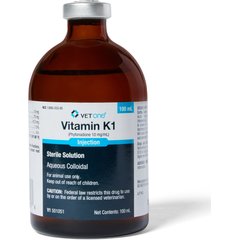Vitamin K1 for Horses
Chalabala/iStock / Getty Images Plus via Getty Images
PetMD’s medications content was written and reviewed by veterinary professionals to answer your most common questions about how medications function, their side effects, and what species they are prescribed for. This content shouldn’t take the place of advice by your vet.
What Is Vitamin K1 for Horses?
Vitamin K1 is a vitamin prescribed for horses as the antidote to vitamin K deficiency associated with ingestion of rat poison (anticoagulant rodenticide) and, less commonly, ingestion of toxic moldy sweet clover hay if a horse consumes it over a long period of time. Vitamin K is essential for normal blood clotting.
Certain toxins in some rat poisons and a toxin produced by moldy sweet clover cause severe deficiency of vitamin K. This prevents blood from clotting normally, resulting in internal bleeding.
Vitamin K1 is administered under the horse’s skin (subcutaneously) or into the muscle (intramuscularly) by a veterinarian. During treatment, your vet may frequently perform blood work to assess how well your horse’s blood is clotting to determine their response to vitamin K1.
Injectable vitamin K1 is available under the brand name Mephyton® and as generic phytonadione or vitamin K1. Vitamin K1 is currently not FDA-approved as a veterinary medication.
However, it is readily utilized in the veterinary field, and veterinarians can legally prescribe certain human drugs in animals in certain circumstances. This is called extra-label or off-label use because this use isn’t described on the drug label.
How Vitamin K1 Works in Horses
Vitamin K1 is the cure for the harmful anti-clotting (anticoagulant) effects of certain rat poisons and the toxic substance in moldy sweet clover. Replenishing vitamin K levels restores the function of the substances in the blood that are essential to normal clotting (clotting factors).
Vitamin K1 Directions for Horses
Generally, your veterinarian will administer the vitamin K injection while your horse is undergoing treatment.
Follow the directions on the drug label or as provided by your veterinarian.
Missed a Dose?
Contact your veterinarian if you miss a dose of Vitamin K1 for your horse.
Possible Vitamin K1 Side Effects in Horses
A non-intravenous injection of vitamin K1 is generally well tolerated in horses but may cause symptoms including:
-
Pain, swelling, and tenderness at the injection site
-
A pool of blood in the muscle (hematoma) after an intramuscular injection
-
Allergic reaction (rare)
Vitamin K1 should not be given intravenously, as it can cause severe allergic reactions including death.
Human Side Effects
Vitamin K1 is also a prescription medication for humans, frequently with dosages different from those prescribed for your pet by a veterinarian. Due to possible side effects, humans should never use medicine dispensed for their pets and pets should not be given any medicine dispensed for a human’s use.
If you accidentally ingest or accidentally inject yourself with this medication, immediately call your physician or the national Poison Control Center hotline at 800-222-1222.
Call Your Vet If:
-
Severe side effects are seen (see above)
-
Your horse’s condition worsens or does not improve with treatment
-
You see or suspect an overdose
-
You have additional questions or concerns about the use of vitamin K1
Vitamin K1 Overdose Information for Horses
Vitamin K1 is unlikely to cause toxicity in a horse undergoing treatment for confirmed vitamin K deficiency.
Toxicity due to an overdose of vitamin K1 is possible in horses who are given vitamin K but do not truly have a vitamin K deficiency.
Overdoses of vitamin K1 in normal horses (without a vitamin K deficiency) can be life-threatening and may cause symptoms of weakness, depression, muscle stiffness, abdominal pain (colic), and kidney failure.
If you suspect an overdose, immediately contact your veterinarian, seek emergency veterinary care, or call an animal poison control center. Consultation fees often apply.
Pet Poison Helpline (855) 764-7661
ASPCA Animal Poison Control (888) 426-4435
Vitamin K1 Storage for Horses
Always confirm storage requirements by reading the prescription label.
Injectable vitamin K1 should be protected from light at all times and stored in a dark place at controlled room temperature between 59-86 F.
Keep out of reach of children and pets.
FAQs:
What does vitamin K1 do for horses?
Vitamin K1 is the antidote in horses to the harmful anti-clotting (anticoagulant) effects of certain rat poisons and the toxic substance in moldy sweet clover. Replenishing deficient levels of vitamin K restores the function of the substances in the blood that are essential to normal clotting (clotting factors).
How is vitamin K1 administered to a horse?
Vitamin K1 is administered under the horse’s skin (subcutaneously) or into the muscle (intramuscularly) by a veterinarian.
No vet writer or qualified reviewer has received any compensation from the manufacturer of the medication as part of creating this article. All content contained in this article is sourced from public sources or the manufacturer.
References
Skinner, Jazmine E., et al. “Vitamin K: history, metabolism, and nutrition in the horse.” Animal Production Science, vol. 64, 4 Apr. 2023.
Stegelmeier, Bryan L. (2020, October). Sweet Clover Poisoning in Animals. Merck Veterinary Manual. https://www.merckvetmanual.com/

